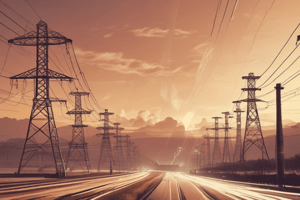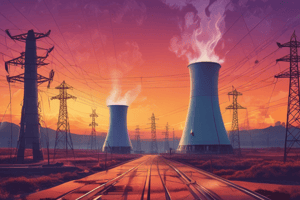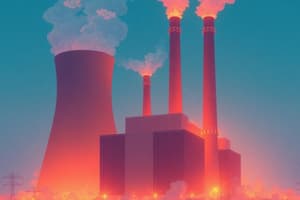Podcast
Questions and Answers
What is the first step in the energy conversion process described?
What is the first step in the energy conversion process described?
- Conversion of chemical energy to heat energy (correct)
- Conversion of mechanical energy to electrical energy
- Conversion of heat energy to mechanical energy
- Conversion of electrical energy to mechanical energy
Which of the following factors does NOT affect the induced voltage when generating electricity?
Which of the following factors does NOT affect the induced voltage when generating electricity?
- Speed of the coil movement through the magnetic field
- Number of turns of the wire cutting through the magnetic field
- Strength of the magnetic field
- Temperature of the conductor (correct)
According to Lenz's law, what will happen to the direction of the induced current?
According to Lenz's law, what will happen to the direction of the induced current?
- It will enhance the magnetic field strength
- It will oppose the motion that produces it (correct)
- It will randomly change direction
- It will be in the same direction as the motion of the coil
What is the final step in the energy conversion process described?
What is the final step in the energy conversion process described?
What characteristic of electromagnetic induction is affected by increasing the relative motion between the conductor and magnetic field?
What characteristic of electromagnetic induction is affected by increasing the relative motion between the conductor and magnetic field?
Which of the following is true about the sources of energy mentioned?
Which of the following is true about the sources of energy mentioned?
In the context of induction, what is referred to as induced voltage?
In the context of induction, what is referred to as induced voltage?
Which of these energy conversion devices would NOT typically use a turbine?
Which of these energy conversion devices would NOT typically use a turbine?
What type of voltage is produced by an elementary DC generator?
What type of voltage is produced by an elementary DC generator?
What must be added to a DC generator to create a more stable output voltage?
What must be added to a DC generator to create a more stable output voltage?
In a two-coil armature setup, what happens when coil A starts dropping off voltage?
In a two-coil armature setup, what happens when coil A starts dropping off voltage?
At what angle does commutation take place in a two-coil armature?
At what angle does commutation take place in a two-coil armature?
What is indicated by the term 'commutation' in the context of generating DC voltage?
What is indicated by the term 'commutation' in the context of generating DC voltage?
How does the output voltage behave when the armature rotates?
How does the output voltage behave when the armature rotates?
What happens during the momentary short occurring during voltage equalization?
What happens during the momentary short occurring during voltage equalization?
What characteristic difference is noted in the output of a two-coil armature compared to a single coil?
What characteristic difference is noted in the output of a two-coil armature compared to a single coil?
What does the left-hand rule for generators indicate?
What does the left-hand rule for generators indicate?
Which of the following statements about current direction is true?
Which of the following statements about current direction is true?
What is the purpose of the sliding contacts in an elementary generator?
What is the purpose of the sliding contacts in an elementary generator?
What does the symbol 'O' signify in terms of current flow in a conductor?
What does the symbol 'O' signify in terms of current flow in a conductor?
What components are part of an elementary generator's armature?
What components are part of an elementary generator's armature?
Which of the following describes the magnetic field in an elementary generator?
Which of the following describes the magnetic field in an elementary generator?
What happens when the loop of wire rotates through the magnetic field in an elementary generator?
What happens when the loop of wire rotates through the magnetic field in an elementary generator?
In an elementary generator, what is indicated by the movement of the armature?
In an elementary generator, what is indicated by the movement of the armature?
What effect does the two-coil armature have on generator output compared to the one-coil armature?
What effect does the two-coil armature have on generator output compared to the one-coil armature?
What is generator ripple?
What is generator ripple?
How can the output of a generator be made smoother?
How can the output of a generator be made smoother?
What is necessary for some turns to be cutting through the magnetic field at right angles?
What is necessary for some turns to be cutting through the magnetic field at right angles?
In what applications are generators particularly useful despite having ripple?
In what applications are generators particularly useful despite having ripple?
What characterizes the output of a one-coil generator compared to a two-coil generator?
What characterizes the output of a one-coil generator compared to a two-coil generator?
What limits the voltage variation in a two-coil armature generator?
What limits the voltage variation in a two-coil armature generator?
What is one of the primary benefits of having a two-coil generator design?
What is one of the primary benefits of having a two-coil generator design?
What is the primary purpose of the field windings in a DC generator?
What is the primary purpose of the field windings in a DC generator?
How are the field windings generally configured in relation to the armature in a DC generator?
How are the field windings generally configured in relation to the armature in a DC generator?
What are the components included in the armature assembly of a DC generator?
What are the components included in the armature assembly of a DC generator?
Which of the following statements is true about the pole pieces in a DC generator?
Which of the following statements is true about the pole pieces in a DC generator?
What is the role of brush holders in a DC generator?
What is the role of brush holders in a DC generator?
What is typically the composition of shunt field windings?
What is typically the composition of shunt field windings?
What is the primary function of the end housings in a DC generator?
What is the primary function of the end housings in a DC generator?
Which material property is primarily reduced in the armature core by laminating it?
Which material property is primarily reduced in the armature core by laminating it?
Study Notes
Energy Conversion in Generators
- Generators convert various energy sources (coal, oil, gas, nuclear, water, solar, wind) into mechanical energy of rotation.
- This mechanical energy is then converted into electrical energy within a generator.
- The process involves three stages: chemical to heat, heat to mechanical, and mechanical to electrical energy.
Electricity Generation from Magnetism
- Moving a wire through a magnetic field generates electricity (induced voltage or emf).
- This method is called induction.
- The induced voltage increases with: increased speed of relative motion, stronger magnetic field, and increased number of turns in the wire.
- Lenz's law dictates that the induced current creates a magnetic field opposing the motion that generates it.
- Electron flow is from the negative terminal (convention used in this text).
The Generator Hand Rule
- A convention is used to represent current flow: "×" indicates current flowing away from the observer, "•" shows current flowing towards the observer.
Elementary Generator
- An elementary generator consists of a loop of wire rotating in a uniform magnetic field.
- Sliding contacts (slip rings) connect the loop to an external circuit, enabling use of the induced emf.
- The rotating loop (armature) is connected to slip rings, which rotate with it.
- Brushes ride against the slip rings to connect the armature to the external circuit.
DC Output of an Elementary Generator
- The initial output of an elementary DC generator is pulsating, not smooth, varying from zero to maximum voltage.
- To improve the DC output, multiple coils are added to the armature.
- A commutator with segments breaks the output into smoother segments.
- Commutation (switching between coils) occurs when voltages in coils are equal, minimizing current flow across commutator segments.
- Generator ripple is the variation in output voltage which is reduced by using multiple coils.
- Many coils significantly reduce generator ripple, creating a steadier DC output.
DC Generator Construction
- Field Windings: Electromagnets (field coils or permanent magnets) generate the required magnetic field. Windings can be series- or parallel (shunt) connected to the armature.
- Main Frame: Provides structural support for the generator components.
- Pole Pieces: Surround the armature and interact with the field windings to generate the magnetic field.
- End Housings: Support the bearings for the armature shaft. The front housing usually contains the brush assemblies.
- Brush Holders: Hold and support the brushes, enabling connection to the external circuit. Adjustable on some generators.
- Armature Assembly: Contains the rotating shaft, laminated core, armature windings, and the commutator to minimize eddy current losses. The core is typically slotted to accommodate the windings.
Studying That Suits You
Use AI to generate personalized quizzes and flashcards to suit your learning preferences.
Related Documents
Description
Explore the principles of energy conversion in generators and the electricity generation through magnetism. This quiz covers the stages of energy transformation and key laws, such as Lenz's law. Test your knowledge on how electrical energy is generated from various sources and the workings of induction.




